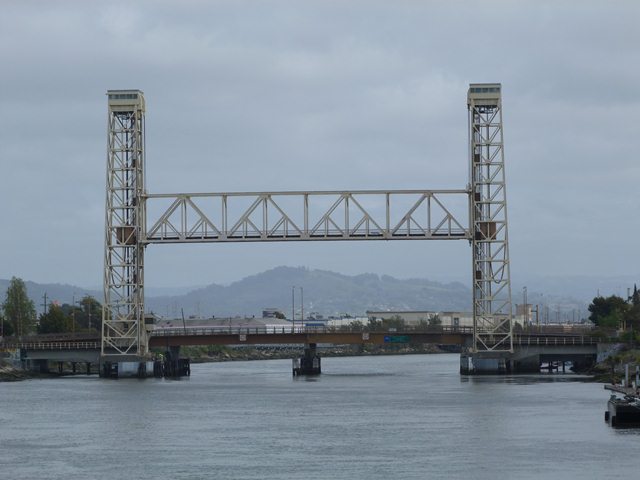We Recommend:
Bach Steel - Experts at historic truss bridge restoration.
Fruitvale Avenue Railroad Bridge

Primary Photographer(s): Nathan Holth
Bridge Documented: April 7, 2013
Railroad (Union Pacific, Former Southern Pacific) Over Oakland Estuary
Alameda and Oakland: Alameda County, California: United States
Metal Rivet-Connected Modified Warren (Subdivided) Through Truss, Movable: Vertical Lift (Tower Drive)
Not Available or Not Applicable
200.0 Feet (61 Meters)
Not Available
25.6 Feet (7.8 Meters)
1 Main Span(s)
Not Applicable

View Information About HSR Ratings
Bridge Documentation
This bridge's future is at risk!
Bridge Status: This historic bridge is at risk for demolition!This bridge was built in 1951, and as such is a fairly late example of a riveted truss bridge, but it still displays some of the attractive details of earlier truss bridges like v-lacing and lattice on built-up beams, as well as a fairly complex truss configuration that produces an attractive geometric art. The bridge is a tower-driven vertical lift bridge, meaning the drive machinery is on the tops of the towers rather than on the middle of the lift span. The towers are 185 feet tall. The bridge when closed provided 13 feet of high tide clearance and can be raised to provide 135 feet of high tide clearance.
The bridge is powered by four 19hp DC motors. In each tower, one motor is the main motor, and a second acts as a backup. The motors in each tower receive power from two different electricity providers, which is an unusual detail. Special equipment ensures that the operation of the motors is in sync. If the motors were not in sync, the bridge would not lift at the same speed at each end which could cause the bridge to jam. The bridge tender has meters that show the balance of the bridge to make sure the span is moving evenly at each end. The bridge has four motor brakes (providing 400 lb./ft torque) plus four machinery brakes applied when the bridge is not in use and providing 1200 lb./ft torque.
The contractors who constructed the bridge included Ben C. Gerwick, Judson-Pacific, Murphy Construction, and Independent Construction Company. The construction cost was $946,757.
The bridge most recently carried 30 train crossings per month, but according to sources this bridge is no longer in use by the railroad and reportedly the tracks that lead up to it have been severed. However, the bridge was not demolished, and since it is over an active waterway, the bridge must be kept in operational condition. The bridge is normally kept at a partially raised height of 65 feet and occasionally raised to full height for larger boats.
The fact that the bridge is not in use by trains might lead one to suspect that it is at risk for demolition. These fears are well-founded. Demolition of this bridge has been proposed in association with a long-term project to demolish and replace the parallel non-historic highway bascule bridge with a new bridge that is supposed to be to be able to survive massive earthquakes with no damage. A better solution would be to convert the bridge for pedestrian use and create a unique linear park over the waterway.
Credit goes to the Alameda County Public Works Agency for providing the details of the operation of this bridge.
![]()
Photo Galleries and Videos: Fruitvale Avenue Railroad Bridge
Bridge Photo-Documentation
Original / Full Size PhotosA collection of overview and detail photos. This gallery offers photos in the highest available resolution and file size in a touch-friendly popup viewer.
Alternatively, Browse Without Using Viewer
![]()
Bridge Photo-Documentation
Mobile Optimized PhotosA collection of overview and detail photos. This gallery features data-friendly, fast-loading photos in a touch-friendly popup viewer.
Alternatively, Browse Without Using Viewer
![]()
Maps and Links: Fruitvale Avenue Railroad Bridge
Coordinates (Latitude, Longitude):
Search For Additional Bridge Listings:
Bridgehunter.com: View listed bridges within 0.5 miles (0.8 kilometers) of this bridge.
Bridgehunter.com: View listed bridges within 10 miles (16 kilometers) of this bridge.
Additional Maps:
Google Streetview (If Available)
GeoHack (Additional Links and Coordinates)
Apple Maps (Via DuckDuckGo Search)
Apple Maps (Apple devices only)
Android: Open Location In Your Map or GPS App
Flickr Gallery (Find Nearby Photos)
Wikimedia Commons (Find Nearby Photos)
Directions Via Sygic For Android
Directions Via Sygic For iOS and Android Dolphin Browser
USGS National Map (United States Only)
Historical USGS Topo Maps (United States Only)
Historic Aerials (United States Only)
CalTopo Maps (United States Only)

